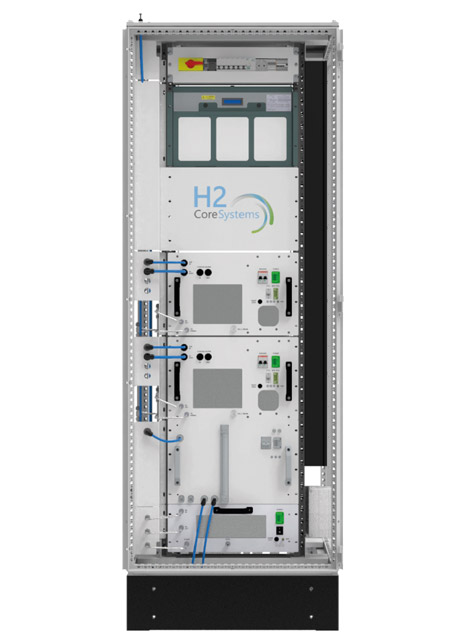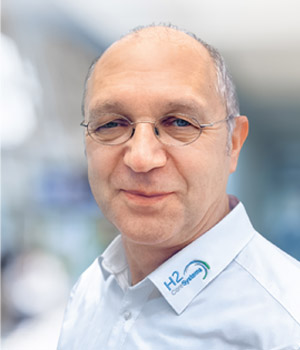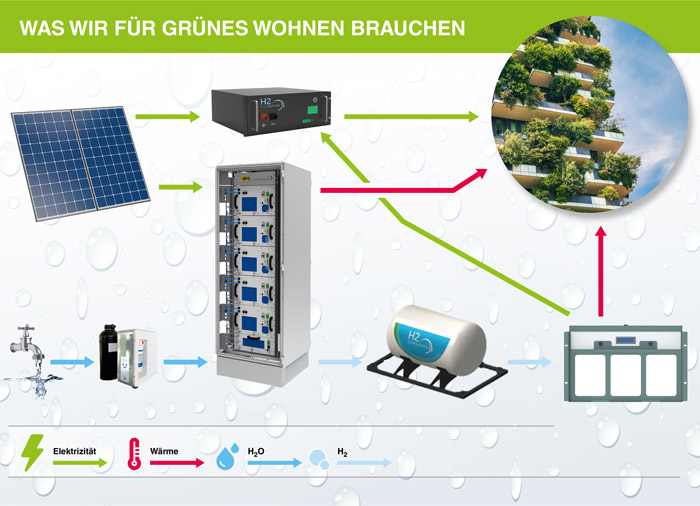Text Daniel Giebel ––– Photography
Climate change and the energy revolution are two of the biggest issues of our time. They have given rise to a whole host of concepts with confusing names such as “sector coupling” and “power to x” (see box), which makes it all the more refreshing when Uwe Küter describes the hydrogen technology that is so important in this context as “charming”. Küter works in Sales & Business Development at H2 Core Systems in Heide, which is about an hour’s drive north of Hamburg.
This systems integrator specialises in building systems that use electricity from renewable sources to convert water into green hydrogen, then store this for use in a whole range of applications. Depending on their size, the company’s modular systems can produce anywhere from one to 450 kilograms of hydrogen a day. Established in 2020 as a spin-off from TC-Hydraulik GmbH, H2 Core Systems currently employs a workforce of over 20, although full order books mean that headcount is on the rise.
Everything in one enclosure
Although Küter is clear that every enquiry is different, customers usually fall into one of two categories: “One will have photovoltaic systems, will want to make direct use of their electricity and will be looking for ways to store it. The other will need heat for industrial processes, will have been using natural gas so far and will want to switch to hydrogen.” The systems from H2 Core Systems serve both purposes.
Housed in 19-inch VX25-series enclosures from Rittal, they combine electrolysis units for producing hydrogen with modules and optional extras such as storage systems, compressors and fuel cells. “The modular baying system from Rittal enables us to combine our electrolysis units and scale them up or down to suit requirements, with anything from one to 40 units in a system. Another key advantage is the excellent stability of the enclosures. After all, a complete electrolysis unit can weigh as much as 500 kilograms.”
During development stages, H2 Core Systems works closely with Berlin-based Enapter AG, which contributes its all-important AEM Electrolysers: “Enapter builds particularly small modules known as stacks. Besides their size, the other major advantage of these is their level of availability – if one stack in the system fails, the others continue to run. There are no losses and the stacks can be replaced relatively easily,” explains Küter.
H2 and Co.
Hydrogen is produced by electrolysis, which involves using electricity to break down water into oxygen and hydrogen. The gas is a useful energy source, and can be stored, transported and used to generate electricity or heat. The only waste product is water vapour. The umbrella term power to X stands for all the ways excess power from renewables can be stored and utilised. These technologies facilitate smart networking between power, heat and mobility, which is known as sector coupling and is an important part of the energy revolution.
A turnkey solution that is easy to use
Thanks to the Rittal enclosure system, H2 Core Systems is able to offer its solutions portfolio on an entirely plug-&-play basis. For example, the systems can usually be installed at the customer’s premises in a single day, normally by just one member of staff. As Küter points out, the aim is to train customers so they can take care of maintenance work and replace parts largely on their own: “We can control a lot from here, over the Internet. The customers point their smartphone camera at the relevant area and we tell them what to do.”
It’s a solution that works worldwide. Turnkey systems from Heide are in use in the UK, the USA, India and Brazil. Küter is enthusiastic: “Hydrogen has a huge advantage, namely that anyone can use it – any municipality, city or country anywhere in the world. All you need is a little water, wind and sun.”


